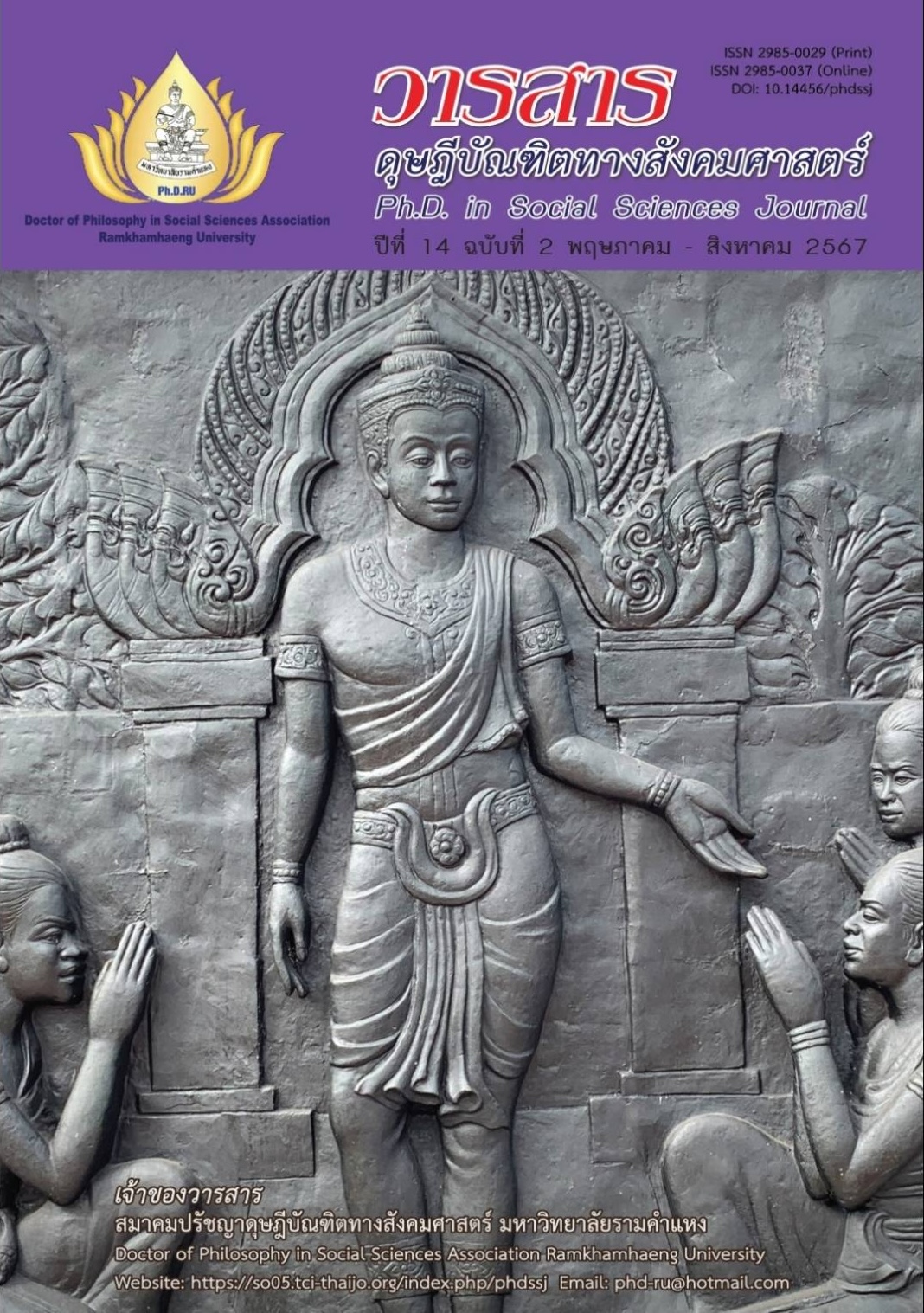การวิเคราะห์อภิมานด้วยโมเดลสมการโครงสร้างของความรู้ เจตคติ และพฤติกรรมการดำเนินชีวิตตามหลักปรัชญาเศรษฐกิจพอเพียงในประเทศไทย
Main Article Content
บทคัดย่อ
บทความวิจัยนี้มีวัตถุประสงค์เพื่อวิเคราะห์อภิมานด้วยโมเดลสมการโครงสร้างของความรู้ เจตคติ และพฤติกรรมการดำเนินชีวิตตามหลักปรัชญาเศรษฐกิจพอเพียงในประเทศไทย ประชากร คือ งานวิจัยเชิงปริมาณที่ศึกษาเปรียบเทียบหรือวิเคราะห์ความสัมพันธ์ระหว่างตัวแปร ตั้งแต่ปี พ.ศ. 2555-2564 จำนวน 36 เรื่อง โดยใช้การคัดเข้าและคัดออกตามเกณฑ์ PRISMA 2020 เครื่องมือที่ใช้ในการวิจัย ได้แก่ แบบประเมินคุณภาพงานวิจัย และแบบสรุปคุณลักษณะงานวิจัย ที่ผ่านการตรวจสอบคุณภาพความตรงตามเนื้อหาจากผู้เชี่ยวชาญจำนวน 3 ท่าน พบว่า ข้อคำถามทุกข้อมีค่าดัชนีความสอดคล้องสูงกว่า .50 โครงการวิจัยผ่านการคัดกรองจากคณะกรรมการจริยธรรมการวิจัยในมนุษย์ ข้อมูลทั้งหมดวิเคราะห์อภิมานด้วยโมเดลสมการโครงสร้างแบบขั้นตอนเดียวโดยวิธีการวิเคราะห์เส้นทางและการวิเคราะห์ตัวแปรกำกับ โปรแกรมคอมพิวเตอร์ที่ใช้วิเคราะห์ข้อมูล คือ webMASEM
ผลการวิจัย พบว่า ความรู้เรื่องเศรษฐกิจพอเพียงมีอิทธิพลทางตรงต่อเจตคติเรื่องเศรษฐกิจพอเพียง (β = .157, p = .030) ความรู้เรื่องเศรษฐกิจพอเพียงไม่มีอิทธิพลทางตรงต่อพฤติกรรมการดำเนินชีวิตตามหลักปรัชญาเศรษฐกิจพอเพียง (β= .094, p = .070) เจตคติเรื่องเศรษฐกิจพอเพียงมีอิทธิพลทางตรงต่อพฤติกรรมการดำเนินชีวิตตามหลักปรัชญาศรษฐกิจพอเพียง (β = .381, p < .001) และความรู้เรื่องเศรษฐกิจพอเพียงมีอิทธิพลทางอ้อมต่อพฤติกรรมการดำเนินชีวิตตามหลักปรัชญาเศรษฐกิจพอเพียงผ่านทางเจตคติเรื่องเศรษฐกิจพอเพียงอย่างมีนัยสำคัญทางสถิติที่ระดับ .05 (β = .060, p = .042) ผลการทดสอบอิทธิพลกำกับ พบว่า ขนาดตัวอย่างมีอิทธิพลกำกับค่าสัมประสิทธิ์อิทธิพลระหว่างความรู้กับเจตคติเรื่องเศรษฐกิจพอเพียง
Article Details

อนุญาตภายใต้เงื่อนไข Creative Commons Attribution-NonCommercial-NoDerivatives 4.0 International License.
บทความวิชาการ บทความวิจัย และบทวิจารณ์หนังสือในวารสารดุษฎีบัณฑิตทางสังคมศาสตร์ เป็นความคิดเห็นของผู้เขียน มิใช่ของคณะผู้จัดทำ และมิใช่ความรับผิดชอบของสมาคมปรัชญาดุษฎีบัณฑิตทางสังคมศาสตร์ มหาวิทยาลัยรามคำแหง (กรณีการทำวิจัยในมนุษย์ ผู้วิจัยต้องผ่านการอบรมจริยธรรมการวิจัยในมนุษย์ และนำหลักฐานมาแสดง)
เอกสารอ้างอิง
Andrade, C. (2020). Sample size and its importance in research. Indian Journal of Psychological Medicine, 42(1), 102-103.
Budsabong, W. (2017). Perception to the concept of philosophy of sufficiency economy of farmers in Khlong Hoi Khong district, Songkhla province. Master’s Thesis of Science (Agricultural Development), Prince of Songkla University. [In Thai]
Charoenjindarat, P. (2019). Application of sufficiency economy philosophy in agriculture and daily life of Debsirinromaklao School. Master’s Thesis of Science (Agricultural Development and Resource Management), King Mongkut’s Institute of Technology Ladkrabang. [In Thai]
Committee on the Honor Project of the National Legislative Assembly. (2017). The king’s philosophy: World leadership in sustainable development, collection of laws supporting projects initiated by His Majesty King Bhumibol Adulyadej The Great. Amarin Printing & Publishing. [In Thai]
Cooper, H., Hedges, L. V., & Valentine, J. C. (Eds.) (2019). The handbook of research synthesis and meta-analysis (3rd ed.). Russell Sage Foundation.
Hamilton, W. K. (2021). MAJOR-meta-analysis for JAMOVI. GitHub.
Jak, S., & Cheung, M. W.-L. (2020). Meta-analytic structural equation modeling with moderating effects on SEM parameters. Psychological Methods, 25(4), 430-455.
Jak, S., Li, H., Kolbe, L., de Jonge, H., & Cheung, M. W.-L. (2021). Meta-analytic structural equation modeling made easy: A tutorial and web application for one-stage MASEM. Research Synthesis Methods, 12(5), 590-606.
Jensantikul, N. (2019). Philosophy of sufficiency economy: Preliminary survey of researches during 2006-2015. Southeast Bangkok Journal, 5(1), 1-11. [In Thai]
Kittivitayapong, R. (2018). Knowledge attitude and practice of the sufficiency economy philosophy of students in Rajamangala University of Technology Rattanakosin. VRU Research and Development Journal Humanities and Social Science, 13(3), 198-209. [In Thai]
Kundu, D. K., Sarker, S., Khan, A. Y., & Samadder, M. (2022). Beyond Knowledge, Attitude and Practice (KAP): A study on the COVID-19 pandemic situation in Bangladesh. Social Science Review, 38(1), 33-52.
Matthay, E. C., Hagan, E., Gottlieb, L. M., Tan, M. L., Vlahov, D., Adler, N., & Glymour, M. M. (2021). Powering population health research: Considerations for plausible and actionable effect sizes. SSM–Population Health, 14, 1-9.
Moonseekaew, M., & Sawangboon, T. (2020). The synthesis of research on teaching and learning using philosophy of sufficiency economy by meta-analysis. Journal of Educational Measurement, 37(101), 171-185. [In Thai]
Nakkla, R. (2013). Casual factors affecting mattayomsueksa 3 students, characteristics on their self-sufficiency in the office of Phayao Secondary Educational Services Area 36 according to the royal project of philosophy of economy sufficiency. Master’s Thesis of Education (Research and Educational Evaluation), Chiang Mai Rajabhat University]. [In Thai]
National Strategy 2018-2037. (2018). Royal Thai Government Gazette, 135(82A), 1-61.
Page, M. J., et al. (2021). The PRISMA 2020 statement: an updated guideline for reporting systematic reviews. BMJ, 372(71). 1-9.
Panoram, P. (2017). Analysis of sufficiency economy philosophy and application from the results of research. Interdiscipinary Management Journal, 1(1), 43-56. [In Thai]
Paul, J., & Barari, M. (2022). Meta-analysis and traditional systematic literature reviews–What, why, when, where, and how?. Psychology & Marketing, 39(6), 1099-1115.
Phatthanawiboon, D. (2018). Living development of farmers based on the philosophy of sufficiency economy in Suwannaphum district, Roi Et province. Doctoral Dissertation of Philosophy (Regional Development Strategy), Rajabhat Maha Sarakham University. [In Thai]
Phuyiemjit, N. (2017). A model of developed as a way of loife by way of sufficiency of non-commmissioned provincial police region 3. Doctoral Dissertation of Public Administration, Rajabhat Maha Sarakham University]. [In Thai]
Sukkarasaranee, S., & Paiwittayasiritham, C. (2020). A meta-analysis of application of sufficiency economy philosophy principle integrated learning in basic education. Silpakorn Educational Research Journal, 12(2), 238-256. [In Thai]
Tanavut, S., Wiroonratch, B., & Thanomsing, L. (2017). The synthesis of implementing element sufficiency economy philosophy in actual business development. Journal of Graduate School of Commerce Burapha Review, 12(1), 45-62. [In Thai]
Tangutairuang, T. (2016). Meta-analytic structural equation modeling technique. Suratthani Rajabhat Journal, 3(2), 57-80. [In Thai]
Thai Chamber of Commerce and Board of Trade of Thailand. (2022). Handbook of results indicators for sustainable community development by applying the philosophy of sufficiency economy. C.M.S. Digital Print. [In Thai]
Thailand International Cooperation Agency. (n.d.). Handbook on the promotion of international development projects based on the application of sufficiency economy philosophy. Author.
The Jamovi Project. (2023). Jamovi (version 2.4). Retrieved from https://www.jamovi.org
Theppitak, T. (2013). The KAP model and a study of behavior and attitude on prevention HIV/AIDS infection in Thai seafarers. Jounal of Management Science Chiang Rai Rajabhat University, 8(2), 84-102. [In Thai]
Tongsamsi, I. (2022). A meta-analysis of factors associated with application of sufficiency economy philosophy in daily life. Princess of Naradhiwas University Journal of Humanities and Social Sciences, 10(1), 95-109. [In Thai]
Toopgrajank. (2020). Applying the royal sufficiency economy philosophy to the way of life of the Border Patrol Police (BPP). Journal of Social Science and Buddhistic Anthropology, 5(8), 123-140. [In Thai]
Weerapatharakul, S. (2015). Developing a living model of the sufficiency economy philosophy for farmers in Satuk district, Burirum province. Doctoral Dissertation of Public Administration, Rajabhat Maha Sarakham University. [In Thai]
Wilson, D. B. (n.d.). Practical meta-analysis effect size calculator. Retrieved from https://campbellcollaboration.org/research-resources/effect-size-calculator.html
Yurarach, S. (2019). An analysis of variables affecting directly and indirectly on living behavior with philosophy of sufficiency economy of bachelor’s degree students. In PIM 9th National and 2nd International Conference 2019: Global Innovation for Sharing Economy (GISE) and 2nd Smart Logistics Conference (pp. C14-C27). Panyapiwat Institute of Management. [In Thai]


